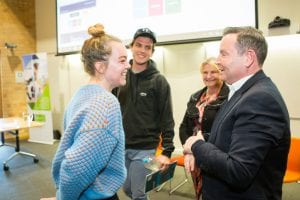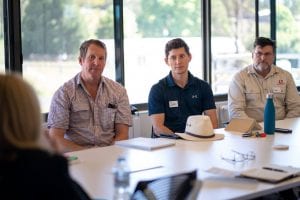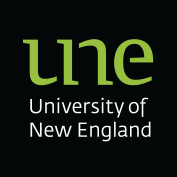UNE Business School is a signatory to the United Nations Principles for Responsible Management Education (UN PRME) which seeks to develop the capabilities of students to be future generators of sustainable value for their workplaces and broader society. The six principles of purpose, values, method, research, partnership and dialogue detail how to enact that commitment.
Teaching and Learning
 MM200 Managing People and Organisations– the major assignment asked students to assess a real company against the six pillars of a sustaining corporation and tied the pillars to specific Sustainable Development Goals (SDGs). Throughout the unit, various topics were also linked to the relevant SDGs to try to integrate these as pillars to support responsible management practice.
MM200 Managing People and Organisations– the major assignment asked students to assess a real company against the six pillars of a sustaining corporation and tied the pillars to specific Sustainable Development Goals (SDGs). Throughout the unit, various topics were also linked to the relevant SDGs to try to integrate these as pillars to support responsible management practice.
The unit is core in our undergraduate business degrees – BBus and BAgribusiness and double degrees. It carries the weight of having an explicit assessment task that asks students to address the SDGs either in the major assignment or the final exam.
Dr Theresa Smith-Ruig incorporates the SDGs into her Strategic Human Resource Management unit, particularly material related to SDG5 on Diversity and SDG3 on Good health and well-being, connecting them with the relevant concepts in her teaching materials in order to demonstrate the relevance of those SDGs for human resource managers. The discussion on SDG 5 Gender Equality will explore the significant barriers to equality experienced by women globally. It will also highlight research conducted by our own academics, such as Professor Alison Sheridan, Dr Sujana Adapa and Theresa on issues such as the poor representation of women on boards and the gender pay gap.
The SDGs are also being addressed in some of our postgraduate units such as MM591 Managing Across Cultures. For example, one of the modules highlights goal 8 of the SDGs: Decent Work and Economic Growth with a particular focus on targets: 8.7. Eradicate forced labour, modern slavery, child labour and human trafficking; and 8.8. Protect labour rights and promote safe and secure working environments for all workers.
In addition, the module highlights goal 16 of the SDGs: Peace, Justice and Strong Institutions, particularly targets: 16.4. Reduce illicit financial and arms flows, strengthen the recovery and return of stolen assets and combat all forms or organised crime; 16.5. Substantially reduce corruption and bribery in all their forms; and 16.6. Develop effective, accountable and transparent institutions at all levels.
Workshop on embedding the SDG’s in curriculum – 2 November 2018.
The PRME 2030 vision is to realise the SDG’s through responsible management education.
We were delighted to host Stephanie Perkiss and Bonnie Dean from UOW who ran a general introduction to embedding the SDG’s into curriculum and a workshop on using the Wikirate tool as a means to have students engage in experiential learning through inputting and /or analysing organisational data of Global Compact signatories. It can be used to have students ask questions about the hard evidence behind company claims to being good citizens by using internationally recognised metrics such as the Global Reporting Initiative.
The workshop was attended by members of faculty across our schools of science, agriculture, business and law. Derek Baker, the unit coordinator for our Banking and Finance units is experimenting with it this trimester with a view to developing an assessment task around it for next year’s offering. We are also working on which of the core Bachelor of Business units would be best placed to use Wikirate as part of its assessment.
 China Study Tour
China Study Tour
The UNE Business School China Study Tour also provides an opportunity for students to look more globally at the issue of responsible management, sustainability and the SDG’s. Students on the tour are studying a range of degrees from agriculture, agricultural economics, agribusiness, business and economics. The major assignment asks them to develop a question on one aspect of their experience in China relevant to their studies and write a 4500 word paper on it. While a broad range of topics are available for exploration the question of how China can manage the tension between meeting its ambitions for economic growth and development while also addressing the question of climate change and other environmental and social challenges. This allows for an exploration of the tension between meeting different SDG’s including SDG 1 No Poverty, SDG 2 No hunger, SDG 3 Health and Wellbeing, SDG 9 Industry Innovation and Infrastructure, SDG 10 Sustainable cities and communities, SDG 12 Responsible production and consumption, SDG 13 Climate action among others.
Research
Much of the research conducted within UNE Business School has a focus on sustainability issues with key points of focus being:
- Australia’s future food and water security: smart science, smart technology
- Climate change and environmental sustainability: protecting biodiversity, effective policies
- Health and wellbeing in rural communities: social exclusion, health inequity, mental health, social policy
- Our communities, our neighbours: regional and rural development, sustainability, prosperity and peace
Some specific projects reported in this year’s report to PRME:
Centre for Agribusiness
A report by David Hadley focussed on the potential for controlled environment horticulture (CEH) development in NSW. This focus is driven by what appears to be a growing trend in the industry towards construction of largescale, technologically complex, high-yielding and resource efficient greenhouses which offer possibilities for meeting future demand for vegetables and other products (both domestically and internationally) in a relatively sustainable way and which could also increase employment opportunities in regional Australia.
Australia’s Carbon Pricing Strategies – a four year project exploring Australia’s carbon pricing strategies reported on in the 2013 and 2016 SIP reports came to a close in 2016. The project team, led by Professor Mahinda Siriwardana from UNE Business School collaborated with AGL Energy Ltd and its Chief Economist (PL of the project), Tim Nelson, who graduated with his PhD in 2016.
A research project funded by the Australian Centre for International Agricultural Research (ACIAR), is being undertaken in partnership with Woolworths – a high-end South African department store -and two of their collaborating abattoirs (Cradock Abattoir in Eastern Cape and Cavalier Meats in Gauteng). The overall aim of the project is to improve the profitability of emerging and smallholder farmers by developing cost-effective and environmentally-sustainable beef value chains that supply cattle to meet the specifications of high-value, free-range beef markets.
Corporate Social Responsibility (CSR) Associate Professor Omar al Farooque’s research focusses on CSR such as social, environmental and economic aspects using both country specific and international data for non-financial corporate entities including Multinational Enterprises. This includes research into The Carbon Disclosure Project (CDP) (https://www.cdp.net/en) and using the Global Reporting Initiative (GRI) (www.globalreporting.org) G3, G3.1 guidelines to measure and assess corporate responses towards social, environmental and economic indicators. The countries of focus are Australia, UK and South Africa. His work also examines the role of diversity on boards of directors in promoting CSR related activities in Malaysia.
UNE SMART Region Incubator
 In 2016, UNE Business School was awarded $1 million in New South Wales (NSW) State Government funding to establish a UNE SMART Region Incubator (SRI), launching officially at beginning of 2017. We have hosted some notable founders such as Dr Shi Zhengron, of SunTech, the world’s largest producer of photovoltaic panels. Dr Shi described the ups and downs of his journey and the challenges with scaling up and finance.
In 2016, UNE Business School was awarded $1 million in New South Wales (NSW) State Government funding to establish a UNE SMART Region Incubator (SRI), launching officially at beginning of 2017. We have hosted some notable founders such as Dr Shi Zhengron, of SunTech, the world’s largest producer of photovoltaic panels. Dr Shi described the ups and downs of his journey and the challenges with scaling up and finance.
One of the startups is SmartShepherd. Founded by Dave Rubie and Glenn Vassallo, SmartShepherd is a system designed for sheep farming which tracks the maternal pedigree of lambs. This information is then used to generate breeding advice for farmers who can then start to make progress with traditionally difficult maternal issues. They aim to enable commercial sheep operations to be as efficient as intensively managed sheep studs at improving flock performance, reducing lamb mortality and increasing the overall welfare of their animals. The company is based in Armidale and temporarily in Shenzhen in China to aid with their initial manufacturing. SmartShepherd won Most Innovative International Startup Pre-Series A at the 2018 Agfunder Innovation Awards at the World Agri-Tech Innovation Summit in San Francisco, CA.
Highlights
The gender pay gap is hurting productivity – in The Conversation with Tom Kennedy and Alison Sheridan In May 2017 year, Dr Tom Kennedy (awarded his PhD in April 2018) and Professor Alison Sheridan worked alongside colleagues Professor Abbas Valadkhani of Swinburne University of Technology and Dr Maria Rae of Deakin University to deliver an in-depth examination of further effects of the wage gap between men and women. The article went on to be the most-read contribution to The Conversation in the month of May.
This highlights UNE Business School’s strength in gender studies and several publications related to gender including Adapa, S. and Sheridan, A. (2018). Small and medium-sized accounting firms in India: Inclusive or exclusive leadership?, in Adapa, S. and Sheridan, A. (Ed). Inclusive Leadership – Negotiating Gendered Spaces, Palgrave MacMillan, pp.67-92.
In addition, Dr Sujana Adapa and Dr Subba Reddy Yarram and Professor Alison Sheridan have been exploring the role of gender and women’s representation as small business owners, their representation on boards, constraints faced by women entrepreneurs.



Recent Comments